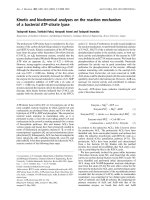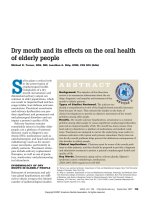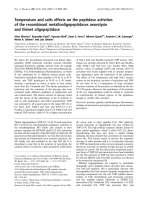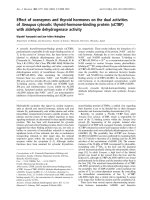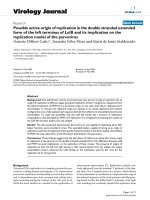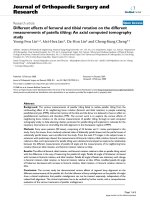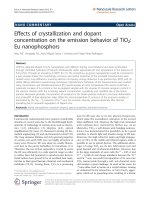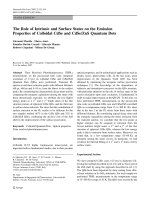Book value, earnings, dividends, and audit quality on the value relevance of accounting information among Nigerian listed firms
Bạn đang xem bản rút gọn của tài liệu. Xem và tải ngay bản đầy đủ của tài liệu tại đây (325.25 KB, 10 trang )
Accounting 4 (2018) 73–82
Contents lists available at GrowingScience
Accounting
homepage: www.GrowingScience.com/ac/ac.html
Book value, earnings, dividends, and audit quality on the value relevance of accounting
information among Nigerian listed firms
Muhammad Yusuf Alkalia, Nasiru Liman Zurub* and Danjuma Safiya Kegudua
Waziri Umaru Federal Polytechnic, Birnin Kebbi, Kebbi State, Nigeria
Utara Malysia, Sintok Kedah Malaysia
CHRONICLE
ABSTRACT
a
bUniveristi
Article history:
Received March 17, 2017
Received in revised format May
11 2017
Accepted July 27 2017
Available online
July 27 2017
Keywords:
Book value
Earnings
Dividends
Nigeria
Financial reporting
The objective of this paper is to determine the effect of International Financial Reporting
Standards (IFRS) as a new accounting reporting among Nigerian listed firms. This study uses
book value, earnings and dividends to fill in the gap using a sample of 126 Nigerian listed firms
in the stock market from 2009 to 2013 (pre and Post-IFRS adoption). Data was collected from
Thompson Reuters, Bank scope DataStreams and annual reports. The study adopted Ohlson
(1995) [Ohlson, J. (1995). Earnings, book-value, and dividends in equity valuation.
Contemporary Accounting Research, 11(2), 661–687.] price model that has been frequently
used in determining the quality of accounting information studies. The study finds that
combined book value, earnings and dividends do not provide statistical significance effects on
IFRS after adoption on the quality of accounting information. This could be possible, as
dividends do not provide a significant effect in the presence of earnings. Furthermore, the audit
big 4 quality provided an effect on the quality of accounting information because of IFRS
adoption. Therefore, findings of this study provide additional literature on the decreasing
quality of accounting information in an emerging market setting like Nigeria. The study
implication is to the policy makers, regulators, and government that accounting information do
not provide value relevance among Nigerian listed firms after IFRS adoption.
© 2018 Growing Science Ltd. All rights reserved.
1. Introduction
Accounting research on financial market has grown since Ball and Brown (1968) produced an empirical
study on stock price fluctuations and accounting information. Their seminal work inspired a string of studies
presenting the relationship between stock market prices and accounting measures. After their study, more
research on value relevance was conducted on the relationship between accounting information with stock
price. There after several definitions of value relevance of accounting information were provided. For
instance, Prather-Kinsey (2006) defined accounting information to be value relevant only when it explains
stock price movement, evaluates the past and the future, and is presented without any bias. Thus, accounting
* Corresponding author. Tel.: +60163729446
E-mail address: (N. Liman Zuru)
© 201 Growing Science Ltd. All rights reserved.
doi: 10.5267/j.ac.2017.7.001
74
information is value relevant once it can assist in predicting variables or can be used in a valuation model
for those variables (Francis & Schipper, 1999a,b). Hence, the ability of one or more numbers to explain
variations in stock prices (Francis et al., 2006) and to also summarise valuable accounting information that
may affect movements of stock prices is critical.
Scholars found the area to be relevant in predicting the quality of accounting information using disclosures
reported in the financial reporting to determine the value relevance. These disclosures include balance sheet
disclosures on assets and liabilities, income statements, cash flows, and earnings using the Ohlson (1995)
price model (Chen et al., 2001). However, these prior studies on value relevance focused on markets in the
United States and the United Kingdom (Barth et al., 1996; Barth et al., 1999; Barth, 1994; Elbakry et al.,
2017).
The increasing significance of financial report for international markets led to more research investigating
the value relevance of accounting information in non-developed markets outside of the United States (Amir
et al., 1993; Collins et al., 1997; Graham et al., 2000), which were extended to emerging markets (Chebaane
& Othman, 2014; Chen et al., 2001; Kargin, 2013; Mironiuc et al., 2015; Umoren & Enang, 2015; Păşcan,
2015). The results of this literature on these emerging markets provided different findings on the relevance
of accounting information with respect to local accounting standards and new accounting reporting
standards for different countries and sectors.
Among the questions needed to be answered about these new standards is whether accounting information
increased or decreased after the adoption of International Financial Reporting Standards (IFRS). This is
particularly a question of interest in Nigeria (Omokhudu & Ibadin, 2015). Consequently, the need exists to
determine empirically whether accounting information provided by firms in Nigeria has become more
useful to investors in the post-IFRS period as compared to the pre-IFRS period.
Some literature exists concerning the value relevance of accounting numbers in Nigeria. For example,
Abdulsallam et al. (2016), Abubakar et al. (2017), Mohammed and Lode (2016), Muhammad et al. (2015),
Omokhudu and Ibadin (2015), Omokhudu and Ibadin (2015), Tanko (2012) and Umoren and Enang (2015)
looked at the effect of IFRS on the value relevance of accounting information. However, the findings have
been mixed and the methods have been varied. For instance, Muhammad et al. (2015) studied book value
and earnings for financial institutions, Omokhudu and Ibadin (2015) and et al. (2017) looked at aggregated
and disaggregated earnings and book value, assets and liabilities, Omokhudu and Ibadin (2015) considered
book value, earnings, dividend and cash flows. Tanko (2012) reported on earnings managements and time
loss recognition. Umoren and Enang (2015) studied earnings and book value. Mohammed and Lode (2016)
investigated on assets and liabilities and Abdulsallam et al. (2016) surveyed on net income and expenses.
These studies apart from Mohammed and Lode (2016) did not consider the effect of firms’ characteristics
like size, leverage or audit big 4 for the value relevance studies. Also, the studies were conducted for either
financial firms or non-financial firms, individually. Therefore, this study defers from all the studies
conducted in Nigeria by employing audit 4, that have been neglected in value relevance studies (Chebaane
& et al., 2014). Thus, the study covers all firms listed in the stock market.
2. Nigerian Capital Market Development
Principally, the Nigerian capital market is where corporate equities as well as long-term debts securities are
traded and issued for long-term investments. The market is heavily regulated by the Nigerian Security and
Exchange Commission (SEC) that is the top body regulating the Nigerian capital market. The Nigerian
stock markets were opened in the early 1960s, as the Lagos Stock Exchange (LSE) as a private liability
company, which was limited by guarantee as provided by the provisions of the LSE Act 1960. The LSE
commenced business in 1961 with 19 listed securities that comprised 6 Federal Government Bonds, 10
Industrial loans and 3 equities (Afolabi, 2015).
M. Y. Alkali et al./ Accounting 4 (2018)
75
Currently, there are two main institutions in the Nigerian market: 1) the Securities and Exchange
Commission (SEC), and 2) the Nigerian Stock Exchange Market (NSE). The SEC acts as the apex body
and serves as the main regulatory authority in the market, while the NSE serves as the issuing houses and
for the stock brokerage firms. The Nigerian capital market is like any other emerging stock market in that it
protects investors from improper and unfair practices in the securities market (Oxford Business Group,
2010).
The major laws that are responsible for the capital market functioning effectively in Nigeria are 1)
Investment and Security Act CAP No. 29 of 2007 (ISA), 2) The rules and regulations pursuant to the ISA,
3) Company Matters and Allied Act (CAMA), 4) the Trustee Investment Act CAP T22, LFN 2004, and 5)
The Pension Act 2004. The market regulatory framework includes the SEC, regarded as the apex regulator
of the stock market, the self-regulator of the market, the investments and security tribunal, and the Economic
and Financial Crime Commission (EFFC).
Three types of trading are performed basically in the Nigerian stock market including 1) equities trading, 2)
bond trading, and (3) exchange-traded funds (ETF). Equities trading in the Nigerian capital market
comprises economic transitions of stocks are also called shares between buyers and sellers that are
considered negotiable instruments that corporations issue to grant a share of the capital of the firm. Any
investor who purchases a share is one of the company’s owners and is entitled to profit the firms pay out in
the form of dividends. There are basically two types of shareholders in Nigerian firms. Most of them are
ordinary shareholders (common shares). The other holders have preferred shareholders of four types: 1)
cumulative preferred shares, 2) non-cumulative preferred shares, 3) participating preferred shares, and 4)
convertible shares.
Bonds listed and trading on the Nigerian stock exchange are the: 1) Federal government bonds, 2)
State/Local government bonds, 3) supranational bonds and 4) corporate bonds. The Nigerian Stock
Exchange defines an ETF as a fund that tracks the efficiency of a commodity or an index. They are traded
like shares in the capital market and have their values derived from the commodity or the index. Investors
are provided an opportunity to diversify their holdings using an ETF without having to diversify their
portfolios by selecting an individual security.
3. Literature Review
Although several studies have cited Ohlson and the Ohlson model for their studies, using book values and
earnings, very little literature used dividends as reported by Ohlson (Pirie & Smith, 2008). With claims that
IFRS has improved accounting information globally, considering the value relevance of accounting
information based on book value earnings and dividends to determine if there is a change in their value
relevance after the IFRS adoption is important.
The adoption of IFRS has been found to be associated with a decrease in earnings. For instance, Clarkson
et al. (2011) and Goodwin and Ahmed (2006) presented evidence that the enhanced value relevance of
IFRS is country specific. They reported that the combined effect of relevance of book value of equity (BVE)
and earnings (NI) had changed with the adoption of IFRS with less consistency in Australia than in
European countries. However, Chalmers et al. (2011) reported that earnings were more value relevant than
book value under IFRS in Australia.
Studies on the value relevance of book value and earnings for different countries, firms, and standards have
also been conducted. For instance, Eng et al. ( 2013) examined the value relevance of book value and
earnings of firms in five Asian countries (Hong Kong, China, Singapore, Japan and Korea) that are reporting
under US-GAAP, IFRS and domestic standards and listed among US American Depositary Receipts
(ADRs) for the period from 2002 to 2011. For domestic samples, book value and earnings had a significant
relationship with the capital market, even though book value had higher incremental value relevance content
than earnings. Nevertheless, firms from the five Asian countries operated in different business
76
environments, but consistent results were documented for IAS-based accounting (Singapore and Hong
Kong) and domestic financial reporting (Korea, Japan, and China). Also, samples listed under ADRs had
higher informative content in book value than earnings under US GAAP. In contrast, after the adoption of
IFRS, earnings were found to be more value relevant than book value; however, a higher incremental value
relevance of book value was reported for US GAAP users.
Kargin (2013) explored the relationship of book value (balance sheet) and earnings (income statement) with
a market value under two different accounting regimes from 1998 to 2011 for Turkish firms. They observed
that book value improved during the period of IFRS adoption. Furthermore, the study discovered no
evidence of earnings improvements in the post-adoption period. Value relevance of accounting information
improved in the post-adoption period. In contrast, Suadiye (2012) examined the significance of IFRS on
the value relevance of financial reporting among the entities listed firms in the Istanbul Stock Exchange for
the period from 2000 to 2009. The study found a significant relationship between book value and earnings
during the transition period.
Agostino et al. (2011) investigated the relevance of the relationship between book value and earnings among
European Banks for the period from 2000 to 2006 using domestic financial reporting to the transition to
IFRS. The findings of their study demonstrated that book value and earnings contained more information
content in the post-adoption period of IFRS compared to pre-adoption period. Studies on book value and
earnings, the relationship between earnings and operating cash flows were also reported by researchers in
other different regimes. For instance, Palea (2014) examined the value relevance of different financial
statements in Italian firms under GAAP and IFRS. The study showed that separate financial reports were
value relevant because they both provided useful information to the capital market. Contrary to
expectations, the findings indicated that reporting under IFRS had less incremental information content than
Italian GAAP.
Clarkson et al. (2011) focused on the effect of IFRS adoption in Australia and Europe between book value,
earnings, and market value. They reported an increase in the value relevance after the IFRS adoption in all
the countries under study. Khanagha et al. (2011) reported that earnings provided higher value relevance of
accounting information than book value did after IFRS adoption among Iranian firms. However, in
comparison, the combined explanatory power of between the pre-and post-adoption periods of IFRS for the
book value and earnings, a decline in value relevance was noticed after the reform. This means that
accounting information has not improved after IFRS adoption among firms listed on the Tehran stock
exchange.
Prior studies have also provided evidences on the decline value relevance of book value, earnings, and
dividends (Collins et al., 1997). Barth et al. (2008) investigated the value relevance of book value and
earnings relationship with stock price and returned for the IAS adopters during the period from 1994 to
2003 in 21 countries. They found an increased value relevance of book value and earnings for the price
regression only. Elbakry et al. (2017) concluded that the value relevance of book value declined with an
increase in earnings among German and UK firms after IFRS adoption. In contrast, they reported both book
value and earnings to have increased in value relevance at the long term for the UK than German firms after
IFRS adoption.
Al-Hares et al. (2012) investigated the relevance of book value, earnings, and dividends from a sample of
non-financial firms listed on the Kuwait Stock Exchange (KSE). The study covers the period from 2003 to
3009. The findings of the study provided evidence of the value relevance of book value and earning after
the IFRS adoption while dividends had no value relevance because of earnings in the valuation model.
However, dividend when separated as individual variables showed sign of an increase in value relevance.
Therefore, based on the above literature the flowing hypotheses were reported
H1: Book value, earnings, dividends, and audit quality disclosed under IFRS are more value relevant than
Book value, earnings dividends, and audit quality disclosed under NGAAP among Nigerian firms.
77
M. Y. Alkali et al./ Accounting 4 (2018)
4. Methodology
The study used a sample of 126 firms listed in the Nigerian stock market over the period of 2009-2013. The
year 2009-2011 was used as the pre-adoption of IFRS and 2012-2013 as the post-adoption of IFRS. The
study data was collected from Thompson Reuters, bank scope DataStreams, and annual reports. The Ohlson
(1995) price regression model that has been mostly adopted on value relevance study used for the study.
The price regression method adopted in this study is from the studies of Burgstahler and Dichev (1997) and
Collins et al. (1997).
Some researchers followed suit using similar procedures as in Francis and Schipper (1999). The dependent
variable is the stock price, and book value, earnings, and dividends as independents variables. We defined
all the results using incremental R2 consistent with (Bogstrand & Larson, 2012; Francis et al., 2006; Mishari,
2016).
Therefore, the following model is drawn from the study
μ
(1A)
SPit = Stock prices per share at end of three months of the fiscal year end
BVit = Book value of equity at the end of fiscal year
EPSit = Earning per share for firm i at the period t
DIVit = Dividend for firm i at the period t
AUDit = Auditors as the dummy variable “1” for “Big 4” auditors and “0” if otherwise
µit = Random error term or disturbance error
4.1 Descriptive Statistics
Table 1
Present descriptive statistics for book value, earnings, and dividend. The table is for the pre-and post-IFRS
adoption using the stock price regressions showing 378 observations for the pre-adoption period (20092011 three years) and 252 firm observations based for the post-adoption period (2012-2013 two years).
Panel A: Stock Price Model
PRE-ADOPTION 2009-2011
Variable
Obs Mean
SP
378
17.7114
BVPS
378
6.1698
EPS
378
1.0676
DIV
378
0.0043
Std. Dev.
61.7596
12.5686
3.4927
65.7136
Min
0.4400
-16.95
-15.93
-39.86
Max
898.00
163.79
38.09
95.89
Ske
0.53
0.50
-0.05
-0.15
Kurt
2.69
2.77
2.59
2.37
Obs
252
252
252
252
POST-ADOPTION 2012-2013
Mean
Std. Dev.
Min
21.3724
77.5763
0.4800
7.6382
11.8957
-1.51
1.3752
3.3482
-2.12
2.0959
29.7554
-30.55
Max
1100.00
77.28
28.08
71.90
Skew
0.47
0.24
0.00
-0.58
Kurt
2.58
2.36
2.33
2.93
Notes: Panel A, SP = share prices three months after the fiscal year for the firm. BVPS = the book value per share for firm i at the end of year t, EPS = earnings per share for firm i at the end
of year t, DIV = dividends for firm i at the end of year t. DIV= dividends for firm i at the end of the year t. All variables are deflated by the total number of outstanding shares.
The number of samples in the post-adoption period was lower than those in the pre-adoption period. The
mean of BVPS was NGN6.1698 (USD0.0387) in the pre-adoption period, which was lower than the mean
of BVPS in the post-adoption period NGN7.6382 (USD0.0479). The mean of EPS was NGN1.0676
(USD0.006840) in the pre-adoption period, which was lower than mean of EPS NGN1.3752 (USD0.00882)
in the post-adoption period. Also, DIV mean was NGN0.0043 (USD0.00003) in the pre-adoption period,
which was lower than the DIV means of NGN2.0959 (USD0.01344) in the post-adoption period. The
variable AUD represents a marginal increase after IFRS adoption. The results of the descriptive statistic
provided evidence of increase in value relevance after IFRS adoption. This could be possible because during
the period there was an increase in stock price and market capitalisation.
4.2 Pearson’s Correlations
Table 2 presents the Pearson’s correlation for the book value earnings and dividends. The correlation matrix
presented coefficients under pre-adoption of IFRS to be significantly correlated with stock prices except for
78
AUD. All variables presented under IFRS adoption have a significant correlation with the stock price. This
means that accounting information under IFRS has greater correlation than pre-adoption. The possibility
for this increase could be attributed to NSE (2013) that reported an increase in stock price and market
capitalisation during the period of 2011 to 2013 by the Nigerian firms.
Table 2
Pearson’s Correlation between Book Value, Earnings, and Dividends
Panel A; Price Model
PRE-ADOPTION 2009-2011
Var
SP
SP
1.0000
BVPS
0.1694***
EPS
0.1392***
DIV
0.1049**
POST-ADOPTION 2012-2013
SP
1.0000
BVPS
0.4929***
EPS
0.1745***
DIV
0.1444***
BVPS
EPS
DIV
1.0000
-0.0973
-0.0967
1.0000
-0.6608*
1.0000
1.0000
0.0609
-0.0696**
1.0000
-0.3212**
1.0000
AUD
Note: *** significance 1%, ** significance 5%, and * significance 10%.
4.3 Regression results
Table 3 provides the regression results of book value, earnings, and dividends for stock price model. The
price regression model coefficients for the pooled data in the Panel A are presented by BVPS, EPS, DIV
and AUD with positive coefficients (0.0548, .2053, 0.0015 and 0.2980 at significance levels of 1%, 1%,
10% and 5% with stock price respectively). The combined explanatory power of the variables in the polled
data provided 47.74% variance with the stock price. The coefficients for all variables were positive and
significant with the stock price. These indicated that Nigerian firms provided reliable information to the
market and hence, reported the coefficient significance in the market value of those firms.
In addition, the variable BVPs suggested an increase in value relevance by presenting greater and positive
coefficients after IFRS adoption (0.05000 and 0.0638 in the pre-and post-adoption periods of IFRS
respectively at a significance level of 1% relationship with stock price).
Table 3
Book Value, Earnings and Dividends Hypothesis (H6)
Panel A: Price Regression Model 4
Price1
α0
β1
Coef
Tvalue
p-value
0.5556***
4.44
0.000
0.0548***
4.15
0.000
Coef
Tvalue
p-value
0.6927***
4.17
0.000
0.0500***
3.13
0.002
1A: β1BVPSit + β2EPSit + β3DIVit + β4AUDit
β2
β2
β3
POOLED DATA 2009-2013
0.2053***
0.0015*
0.2980**
4.71
1.88
2.43
0.000
0.061
0.015
PRE-ADOPTION 2009-2011
0.1929***
0.0011
0.2616*
3.56
1.64
2.04
0.000
0.101
0.057
POST-ADOPTION 2012-2013
0.2174***
0.0046***
0.3304*
4.06
3.24
1.77
0.000
0.001
0.079
P = 0.000
1.23
1.00
1.00
R2
0.4774
0.4098
Coef
0.3407**
0.0638***
0.5822
Tvalue
1.97
5.07
p-value
0.050
0.000
White test
Chi = 400.49
VIF
1.23
Chow test (1960)
F = 2.43
P = 0.1192
Notes: *** significance 1%, **significance 5%, and * significance 10%.
1 price regression: SP = β1BVPSit + β2EPSit + β3DIVit + β4AUDit
Variable definitions for Table 5.22: SP = Share price of the firm three months after the year end t. BVPSit = Book value per share of firm i at the end of fiscal year t.
EPSit = Earnings per share for firm i at the end of fiscal year t. DIVit = Dividends per share for firm i at the end of fiscal year t. AUDi t = Auditor is the dummy variable
for firms that use Big 4 audit firms and 0 otherwise for firm i at the end of fiscal year t. β = Coefficient of the explanatory variables. R2 = Adjusted R2 within the
panel regression. The Chow test (1960) is for the statistical difference in adjusted R2 between Pre-and Post-adoption of IFRS from table lists p-values. All p-values
are estimated based on White’s (1980) corrected error for heteroscedasticity.
M. Y. Alkali et al./ Accounting 4 (2018)
79
The variable EPS indicated an increase in value relevance after IFRS adoption by presenting positive
coefficients of 0.001929 and 0.2174 in the pre-and post-adoption periods of IFRS respectively at
significance levels of 1% each in a relationship with stock price, respectively. The variable Dividends did
not support any significant relationship with stock price during the pre-adoption period, consistent with AlHares et al. (2012), in contrast, during the post-adoption had a positive coefficient of 0.00460 at a
significance level of a 1% relationship with stock price. The AUD variable was also positive in the pre-and
post-adoption period (pre=0.2616 and post=0.3304) at a significance level of a 10% relationship with stock
price.
The adjusted R2 for the pre-adoption period was 40.98%, which was lower than the pre-adoption period of
58.22% in explaining the power of variance with the stock price. The increased in explanatory power after
IFRS adoption, signifies an increase in value relevance of accounting information. However, the Chow test
(1960) for significance differences between the two periods suggested no significance differences between
the two periods (value relevance, F = 2.43 at significant level p-value = 0.1192). Therefore, the hypothesis
(H1) for more value relevance of book value, earnings, and dividend after IFRS adoption cannot be
supported.
The effect of AUD big 4 presented a significant decrease when analysis was run without AUD big 4.
The full samples with AUD big 4 reported coefficients of determination R2 for the pooled data to be
47.74%, pre-adoption 40.98%, and post adoption 58.22% under stock price model. The results for the
variable with non-Big four provided coefficients of determination R2 for the pooled data of 46.92%,
pre-adoption 40.50% and post-adoption 56.74% under stock price model.
4.5 Robustness Test for Non-Financial
The estimated coefficients provided for the sub-samples were significant like those of the full samples, preand post-adoption of IFRS in term of coefficients, significances and R2s. The result of the findings for the
price regression model presented an increased in value relevance for full samples on non-financial firms
(although not reported here). The stock price pre-IFRS adoption reported R2 for the full samples that were
greater than the post-adoption of IFRS R2 (Pre-adoption= 40.98% versus Post-adoption =58.22%).
However, the findings from the non-financial firms provided an increase in R2 from pre-adoption to postadoption of IFRS (Pre-adoption=41.75% versus Post-adoption=48.25%). The increased value relevance
does not change the decision that financial institutions have any effect on the value relevance of financial
reporting. The findings are consistent with (Okafor et al., 2016).
Therefore, it can be reported that the findings were robust enough. The Chow test (1960) for the sub-sample
did not provide any statistical significance difference between the two R2s for the stock price n model.
Therefore, the conclusion for increased in value relevance could not be altered for non-financial firms, but
the value relevance could not be presented.
5. Conclusion
This paper has determined the relative value relevance of accounting information after IFRS adoption
among Nigerian firms. The central issue of the study was to determine whether accounting information had
been affected by the adoption of IFRS in Nigeria among Nigerian firms. This was because the issue of the
effect of IFRS on the value relevance of accounting information has still not resolved.
Using a comprehensive dataset of 126 listed firms in Nigeria, from the year 2009 to 2013, we have perform
a regression analysis using stock price models that have frequently been used in determining the quality of
accounting information. We have documented from the findings that, the results from the coefficients, a
relative value relevance increase for book value, earnings and dividends was noticed from pre-adoption to
the post-IFRS period. The increase in explanatory power has presented an increase in value relevance after
IFRS adoption. However, the result from Chow test (1960) does not support any statistical significance
80
increase between the two periods. This has provided evidence that there is no statistical change between the
pre-and post-IFRS adoption among Nigerian firms. The study findings on the effect of AUD big 4 on the
increase in value relevance was determined by the increase in explanatory power of R2 for the variables
with AUD big 4 and those without AUD big 4. The results of the finding suggested an effect of AUD big 4
as a result of IFRS adoption in Nigeria.
Although, most of the studies conducted in Nigeria reported an increase in value relevance of accounting
information after IFRS adoption for book value, earnings, and dividends. This study finding reported similar
results of incremental value relevance, but the statistical significance difference of the explanatory power
between pre-and post-adoption of IFRS cannot be reported. Therefore, other studies that reported an
increased in value relevance of accounting information could not be true because they do not provide
evidence of statistical significance difference between the two periods (pre-and post-IFRS adoption). This
shows that accounting information provided before the IFRS adoption do not have any difference after the
IFRS adoption among listed firms in Nigeria. This could perhaps be as a result of accounting reporting
change immediately after financial crisis for the book value, earnings, and dividends or that the presence of
dividends has an effect on the result as reported in the literature. Therefore, policy makers, regulators,
government, and professionals need to look at the new accounting reporting effect on the capital market
We suggest that future study should consider the value relevance of specific variables (book value, earnings,
and dividends) among listed Nigerian firm. Also, another developing country GAAP for an extended period
whether there is an effect of IFRS and is statistically significant. The effect can also be used to less
developed and smaller country than Nigeria to know what generalities, with regard to value relevance of
accounting information as a result of IFRS adoption.
References
Abdulsallam, N., Yelwa, M., Muhammad, A., Alkali, Y., Abdul, S., & Bala, R. (2016). Quality of
accounting reporting after the IFRS adoption in Nigeria. International Journal of Business,
Economics and Management, 3(11), 160–172.
Abubakar, M. Y., Abdulsallam, N., & Alkali, M. Y. (2017). The Impact of the New Accounting
Reporting Among Listed Firms in Nigerian Stock Market. Asian Journal of Social Sciences and
Management Studies, 4(1), 1–9.
Afolabi, A. A. (2015). Impact of the Nigerian capital market on the economy. European Journal of
Accounting Auditing and Finance Research, 3(2), 88–96.
Agostino, M., Drago, D. & Silipo, D.B. (2011). The value relevance of IFRS in the European banking
industry. Review of Quantitative Finance and Accounting, 36(3), 437–57.
Al-Hares, O. M., AbuGhazaleh, N. M., & Haddad, A. E. (2012). Value relevance of earnings, book
value and dividends in an emerging capital market: Kuwait evidence. Global Finance Journal,
23(3), 221–234. />Amir, E., Harris, T., & Venuti, E. (1993). A comparison of the value-relevance of US versus non-US
GAAP accounting measures using form 20-F reconciliations. Journal of Accounting Research,
31(3), 230–264. />Elbakry, A. E., Nwachukwu, J. C., Abdou, H. A., & Elshandidy, T. (2017). Comparative evidence on
the value relevance of IFRS-based accounting information in Germany and the UK. Journal of
International Accounting, Auditing and Taxation, 28, 10-30.
Ball, R., & Brown, P. (1968). An empirical evaluation of accounting income numbers. Journal of
Accounting Research, 6, 159–178.
Barth, M. E. (1994). Value accounting: Evidence from investment securities and the market valuation
of banks. The Accounting Review, 69(1), 1–25. />Barth, M. E., Beaver, W. H., & Landsman, W. R. (1996). Value-relevance of banks’ fair value
disclosures under SFAS No. 107. Accounting Review. />Barth, M. E., Landsman, W. R., & Lang, M. H. (2008). International Accounting Standards and
Accounting Quality. Journal of Accounting Research, 46(3), 467–498.
M. Y. Alkali et al./ Accounting 4 (2018)
81
Barth, M. R., Braver, W. H., Hand, J. M., & Landsman, W. R. (1999). Accruals, cash flows, and equity
values. Review of Accounting Studies, 4(3), 205–229.
Bogstrand, O., & Larson, E. A. (2012). Have IFRS Contributed to an Increased Value-Relevance ?
Uppsala University. Department of Business Studies, (1606), 1–33.
Burgstahler, D., & Dichev, I. (1997). Earnings management to avoid earnings decreases and losses.
Journal of Accounting and Economics, 24, 99-126.
Chalmers, K., Clinch, G., & Godfrey, J. M. (2011). Changes in value relevance of accounting
information upon IFRS adoption: Evidence from Australia. Australian Journal of Management,
36(2), 151–173. />Chebaane, S., & Othman, H. Ben. (2014). The impact of IFRS adoption on value relevance of earnings
and book value of equity: The case of emerging markets in African and Asian regions. Procedia Social and Behavioral Sciences, 145(November 2015), 70–80.
Chen, C. J. ., Chen, S., & Su, X. (2001). Is accounting information value-relevant in the emerging
Chinese stock market? Journal of International Accounting, Auditing and Taxation, 10(1), 1–22.
Clarkson, P., Hanna, J. D., Richardson, G. D., & Thompson, R. (2011). The impact of IFRS adoption
on the value relevance of book value and earnings. Journal of Contemporary Accounting and
Economics, 7(1), 1–17. />Collins, D. W., Edward, L. M., & Weiss, I. S. (1997). Changes in the value-relevance of earnings and
book values over the past forty years. Journal of Accounting and Economics, 24(1), 39–67.
Elbakry, A. E., Jacinta, C. N., Hussein, A. A., & Tamer, E. (2017). Comparative evidence on the value
relevance of IFRS-based accounting information in Germany and the UK. Journal of International
Accounting, Auditing and Taxation, 28, 10–30.
Eng, L. L., Sun, L., & Vichitsarawong, T. (2013). The valuation properties of earnings and book values
reported under IAS, domestic GAAP and U.S. GAAP: Evidence from China, Hong Kong, Japan,
Korea and Singapore. Advances in Accounting, 29(2), 278–285.
Francis, J., & Schipper, K. (1999a). Have financial statements lost their relevance? Journal of
Accounting Research, (2000), 1–4. Retrieved from />Francis, J., & Schipper, K. (1999b). Have Financial Statements Lost Their Relevance? Journal of
Accounting Research, 37(2), 319–352. />Francis, J., Olsson, P., & Schipper, K. (2006). Earnings quality. Foundations and Trends in Accounting,
1(4), 259–340.
Goodwin, J., & Ahmed, K. (2006). Longitudinal value relevance of earnings and intangible assets:
Evidence from Australian firms. Journal of International Accounting, Auditing and Taxation, 15(1),
72–91. />Graham, R., King, R., & Bailes, J. (2000). The value relevance of accounting information during a
financial crisis: Thailand and the 1997 decline in the value of the baht. Journal of International
Financial Management and Accounting, 11(2), 84–107. />Ohlson, J. (1995). Earnings, book-values, and dividends in equity valuation. Contemporary Accounting
Research, 11(2), 661–687.
Kargin, S. (2013). The impact of IFRS on the value relevance of accounting information: Evidence
from Turkish firms. International Journal of Economics and Finance, 5(4), 71–80.
Khanagha, J. B., Mohamad, S., Hassan, T., & Sori, Z. M. (2011). The impact of reforms on the value
relevance of accounting information: Evidence from Iran. African Journal of Business Management,
5(1), 96–107.
Lev, B., & Sougiannis, T. (1996). The capitalization, amortization, and value-relevance of R&D.
Journal of Accounting and Economics, 21(1), 107–138.
Mironiuc, M., Carp, M., & Chersan, I.-C. (2015). The Relevance of Financial Reporting on the
Performance of Quoted Romanian Companies in the Context of Adopting the IFRS. Procedia
Economics and Finance, 20(15), 404–413. />Mishari, M. A. (2016). The role of audit quality in firm valuation Evidence from an emerging capital
market with a joint audit requirement. International Journal of Law and Management, Vol 58(5),
575–598.
82
Mohammed, Y. A., & Lode, N. A. (2016). The value relevance of accounting disclosures among listed
Nigerian firms: IFRS adoption. Iranian Journal of Management Studies (IJMS), 9(4), 707–740.
/>Muhammad, M. B., Kamarul, B. B. A. M., & Ishak, R. B. (2015). Relative and Incremental Value
Relevance of Equity and Earnings in the Nigerian Financial Industry After Mandatory Adoption of
International Financial Reporting Standard (IFRS). Advanced Science Letters, 21(6), 1927–1930.
Muhammad, Y. A., & Lode, N. A. (2015). Value relevance of liabilities and non-performing loans in
emerging market: IFRS adoption in Nigeria. Advanced Science Letters, 21(6), 2015–2019.
/>NSE. (2013). Capital market bulleting.
Ohlson, J. (1995). Earnings, book-value, and dividends in equity valuation. Contemporary Accounting
Research, 11(2), 661–687.
Okafor, O. N., Anderson, M., & Warsame, H. (2016). IFRS and value relevance: evidence based on
Canadian adoption. International Journal of Managerial Finance, 12(2), 136–160.
/>Omokhudu, O. O., & Ibadin, P. O. (2015). Incremental Value Relevance of Disaggregated Book Values
and Disaggregated Earnings: Evidence from Nigeria. Accounting and Finance Research, 4(3), 20–
30. />Oxford Business Group. (2010). The report Nigeria 2010.
Palea, V. (2014). Are IFRS value-relevant for separate financial statements? Evidence from the Italian
stock market. Journal of International Accounting, Auditing and Taxation, 23(1), 1–17.
/>Păşcan, I.-D. (2015). Measuring the Effects of IFRS Adoption on Accounting Quality: A Review.
Procedia Economics and Finance, 32(15), 580–587. />Pirie, S., & Smith, M. (2008). Stock prices and accounting information: evidence from Malaysia. Asian
Review of Accounting, 16(2), 109–133. />Prather-Kinsey, J. (2006). Developing countries converging with developed-country accounting
standards: Evidence from South Africa and Mexico. The International Journal of Accounting, 41,
141-162.
Suadıye, G. (2012). Value Relevance of Book Value & Earnings Under the Local GAAP and IFRS:
Evidence from Turkey. Yerel Muhasebe Standartlarına ve UFRS’ye Göre Hazırlanan Kar ve
Özkaynak Rakamlarının Hisse Senedi Fiyatlarına Yansıması: Türkiye Örneği., 12(3), 301–310.
Tanko, M. (2012). The Effect of International Financial Reporting Standards (IFRS) Adoption on the
Performance of Firms in Nigeria. Journal of Administrative and Economic Sciences, 5(2), 133–157.
Umoren, A. O., & Enang, E. R. (2015). IFRS Adoption and Value Relevance of Financial Statements
of Nigerian Listed Banks. International Journal of Finance and Accounting, 4(1), 1–7.
/>© 2017 by the authors; licensee Growing Science, Canada. This is an open access
article distributed under the terms and conditions of the Creative Commons Attribution
(CC-BY) license ( />
